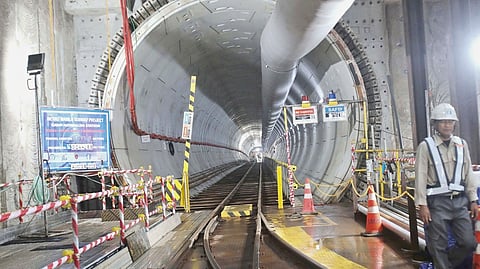
- NEWS
- the EDIT
- COMMENTARY
- BUSINESS
- LIFE
- SHOW
- ACTION
- GLOBAL GOALS
- SNAPS
- DYARYO TIRADA
- MORE

The funds for the Metro Manila Subway and the Philippine National Railways (PNR) expansion — flagship projects touted to transform urban transport before 2030 — had been gutted in recent budgets, a minority lawmaker revealed, blaming what he called “negligence and collusion” between Malacañang and Congress.
House Senior Deputy Minority Leader Edgar Erice said in an interview on Wednesday that allocations for more than 15 major infrastructure projects under the Marcos administration were slashed in the 2023, 2024, and 2025 General Appropriations Acts (GAA) to make room for congressional “insertions” that had ballooned to a staggering P1.45 trillion.
“P1.45 trillion, unprecedented, largest in the history of Congress. In three years, P1.45 trillion in amendments and insertions, which are the same,” Erice said partly in Filipino.
“Worse, the important flagship projects, which were foreign-assisted projects, were defunded and [redirected] to projects that were not studied by the agencies concerned,” he added.
The Metro Manila Subway and the expanded PNR — also known as the North-South Commuter Railway (NSCR) — had estimated costs of P488.5 billion and P873.6 billion, respectively, or a combined price tag of P1.4 trillion.
Japan will shoulder the bulk of the project’s cost through a loan agreement, while the Philippines will provide an equity contribution.
Erice said, however, the government’s stake was taken out of the budgets and reallocated to projects that lacked proper evaluation and planning but were endorsed by lawmakers in the previous 19th Congress.
Due to the lack of funding, the completion of the Metro Manila Subway and the NSCR will be delayed for four years, from 2028 to 2032 and from 2029 to 2034, respectively.
As a result, the government now faces an estimated P300 billion in financial repercussions — covering commitment fees, penalties, and costs for materials and labor, among other things.
Erice said the situation might have been avoided if the Department of Budget and Management (DBM) had thoroughly vetted the General Appropriations Bills (GAB) before they were signed into law by President Marcos.
The Caloocan lawmaker said it was puzzling why the DBM did not question such massive insertions, which he classified as “red flags,” suggesting complicity between the executive branch and Congress.
“I’m just wondering — in 2023, 2024, the executive department already knew that Congress was doing that. Why did this still slip through in 2025? I think there was also negligence on the part of the DBCC or the DBM,” he said. “Why didn’t they advise the President? He could have vetoed it.”
Erice also attributed the irregularities to the power imbalance in Congress, saying the opposition could do little about the budget alignment because the supermajority dominated the chamber.
The 2025 General Appropriations Act (GAA) — criticized by some lawmakers as the “most corrupt” budget ever passed by Congress — initially totaled P6.352 trillion but this was later trimmed to P6.326 trillion after President Marcos vetoed P194 billion in line items deemed inconsistent with his administration’s priority programs. Of the vetoed items, P16.7 billion had been earmarked for flood control projects.
This year’s budget has also faced sharp criticism for its allegedly bloated unprogrammed appropriations, which had ballooned to nearly P2 trillion since 2023.
Opposition lawmakers branded the UA as a conduit for corruption and pushed to scrap it from the 2026 budget where it had an allocation of P250 billion.
Unprogrammed appropriations serve as “standby funds” that the government can access when it collects more revenue than projected or receives foreign loans and grants. Traditionally, these funds are reserved for emergency needs or priority programs, such as infrastructure projects and social assistance initiatives.
In 2023 and 2024, a staggering P141 billion in unprogrammed appropriations was reportedly used to fund flood control projects — now at the center of a sweeping investigation into alleged corruption involving members of Congress, DPWH officials, and private contractors.
